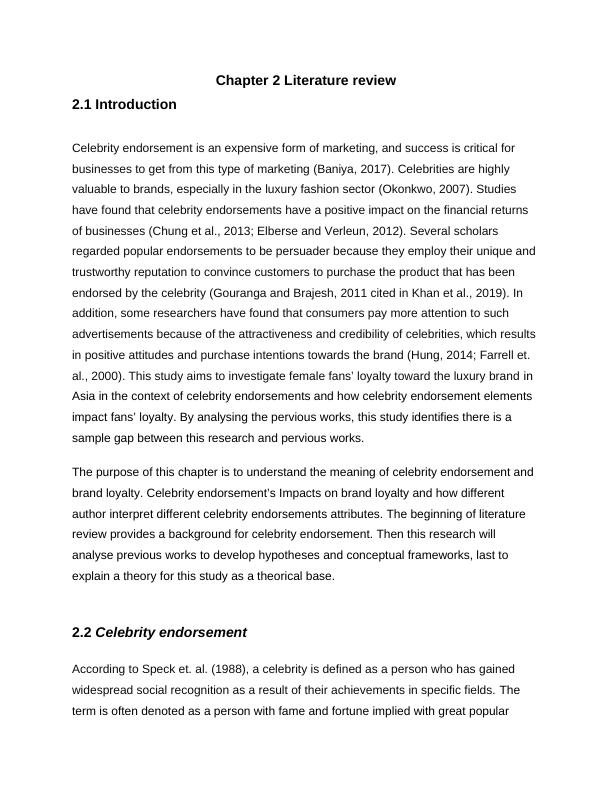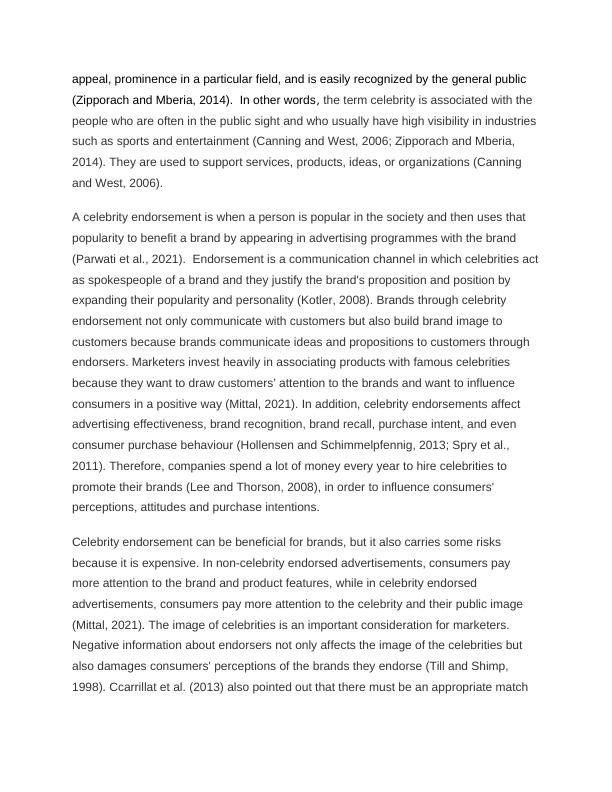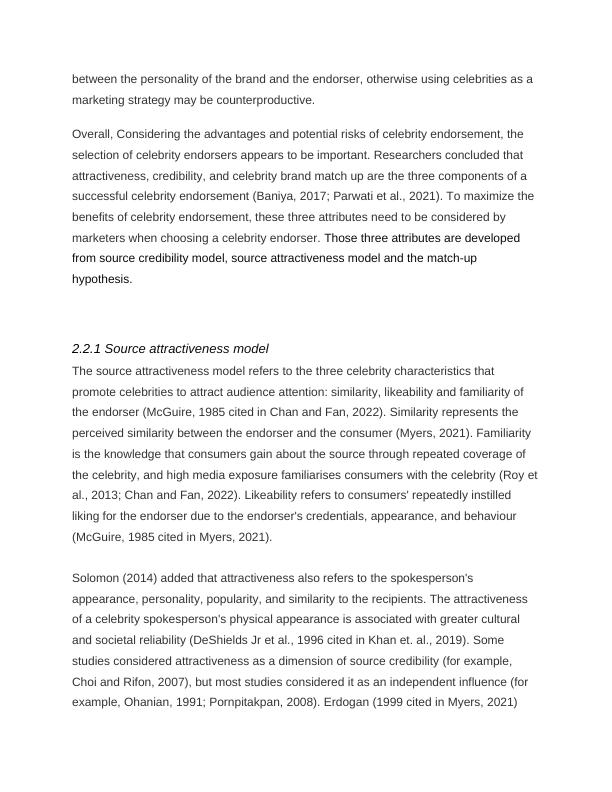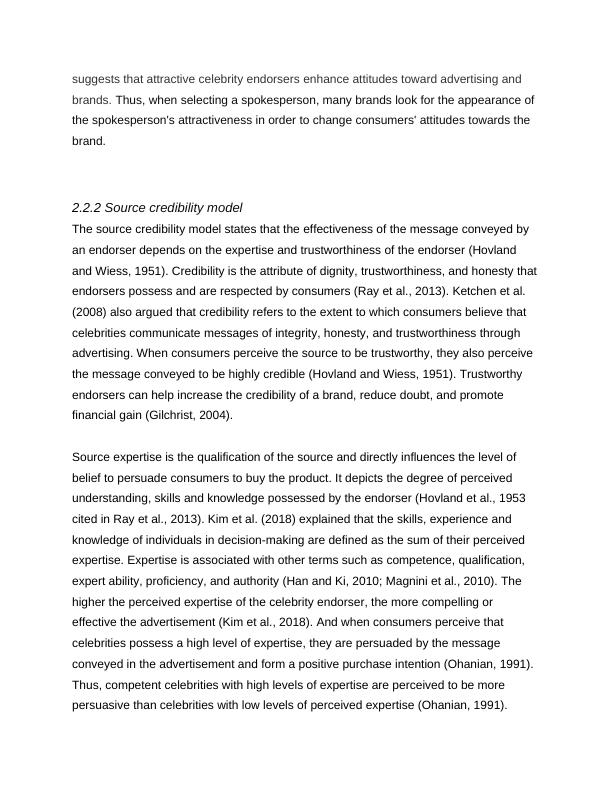Literature review BMAN70172 - University of Manchester
Added on 2023-04-19
11 Pages4072 Words357 Views
Chapter 2 Literature review
2.1 Introduction
Celebrity endorsement is an expensive form of marketing, and success is critical for
businesses to get from this type of marketing (Baniya, 2017). Celebrities are highly
valuable to brands, especially in the luxury fashion sector (Okonkwo, 2007). Studies
have found that celebrity endorsements have a positive impact on the financial returns
of businesses (Chung et al., 2013; Elberse and Verleun, 2012). Several scholars
regarded popular endorsements to be persuader because they employ their unique and
trustworthy reputation to convince customers to purchase the product that has been
endorsed by the celebrity (Gouranga and Brajesh, 2011 cited in Khan et al., 2019). In
addition, some researchers have found that consumers pay more attention to such
advertisements because of the attractiveness and credibility of celebrities, which results
in positive attitudes and purchase intentions towards the brand (Hung, 2014; Farrell et.
al., 2000). This study aims to investigate female fans’ loyalty toward the luxury brand in
Asia in the context of celebrity endorsements and how celebrity endorsement elements
impact fans’ loyalty. By analysing the pervious works, this study identifies there is a
sample gap between this research and pervious works.
The purpose of this chapter is to understand the meaning of celebrity endorsement and
brand loyalty. Celebrity endorsement’s Impacts on brand loyalty and how different
author interpret different celebrity endorsements attributes. The beginning of literature
review provides a background for celebrity endorsement. Then this research will
analyse previous works to develop hypotheses and conceptual frameworks, last to
explain a theory for this study as a theorical base.
2.2 Celebrity endorsement
According to Speck et. al. (1988), a celebrity is defined as a person who has gained
widespread social recognition as a result of their achievements in specific fields. The
term is often denoted as a person with fame and fortune implied with great popular
2.1 Introduction
Celebrity endorsement is an expensive form of marketing, and success is critical for
businesses to get from this type of marketing (Baniya, 2017). Celebrities are highly
valuable to brands, especially in the luxury fashion sector (Okonkwo, 2007). Studies
have found that celebrity endorsements have a positive impact on the financial returns
of businesses (Chung et al., 2013; Elberse and Verleun, 2012). Several scholars
regarded popular endorsements to be persuader because they employ their unique and
trustworthy reputation to convince customers to purchase the product that has been
endorsed by the celebrity (Gouranga and Brajesh, 2011 cited in Khan et al., 2019). In
addition, some researchers have found that consumers pay more attention to such
advertisements because of the attractiveness and credibility of celebrities, which results
in positive attitudes and purchase intentions towards the brand (Hung, 2014; Farrell et.
al., 2000). This study aims to investigate female fans’ loyalty toward the luxury brand in
Asia in the context of celebrity endorsements and how celebrity endorsement elements
impact fans’ loyalty. By analysing the pervious works, this study identifies there is a
sample gap between this research and pervious works.
The purpose of this chapter is to understand the meaning of celebrity endorsement and
brand loyalty. Celebrity endorsement’s Impacts on brand loyalty and how different
author interpret different celebrity endorsements attributes. The beginning of literature
review provides a background for celebrity endorsement. Then this research will
analyse previous works to develop hypotheses and conceptual frameworks, last to
explain a theory for this study as a theorical base.
2.2 Celebrity endorsement
According to Speck et. al. (1988), a celebrity is defined as a person who has gained
widespread social recognition as a result of their achievements in specific fields. The
term is often denoted as a person with fame and fortune implied with great popular

appeal, prominence in a particular field, and is easily recognized by the general public
(Zipporach and Mberia, 2014). In other words, the term celebrity is associated with the
people who are often in the public sight and who usually have high visibility in industries
such as sports and entertainment (Canning and West, 2006; Zipporach and Mberia,
2014). They are used to support services, products, ideas, or organizations (Canning
and West, 2006).
A celebrity endorsement is when a person is popular in the society and then uses that
popularity to benefit a brand by appearing in advertising programmes with the brand
(Parwati et al., 2021). Endorsement is a communication channel in which celebrities act
as spokespeople of a brand and they justify the brand's proposition and position by
expanding their popularity and personality (Kotler, 2008). Brands through celebrity
endorsement not only communicate with customers but also build brand image to
customers because brands communicate ideas and propositions to customers through
endorsers. Marketers invest heavily in associating products with famous celebrities
because they want to draw customers’ attention to the brands and want to influence
consumers in a positive way (Mittal, 2021). In addition, celebrity endorsements affect
advertising effectiveness, brand recognition, brand recall, purchase intent, and even
consumer purchase behaviour (Hollensen and Schimmelpfennig, 2013; Spry et al.,
2011). Therefore, companies spend a lot of money every year to hire celebrities to
promote their brands (Lee and Thorson, 2008), in order to influence consumers'
perceptions, attitudes and purchase intentions.
Celebrity endorsement can be beneficial for brands, but it also carries some risks
because it is expensive. In non-celebrity endorsed advertisements, consumers pay
more attention to the brand and product features, while in celebrity endorsed
advertisements, consumers pay more attention to the celebrity and their public image
(Mittal, 2021). The image of celebrities is an important consideration for marketers.
Negative information about endorsers not only affects the image of the celebrities but
also damages consumers' perceptions of the brands they endorse (Till and Shimp,
1998). Ccarrillat et al. (2013) also pointed out that there must be an appropriate match
(Zipporach and Mberia, 2014). In other words, the term celebrity is associated with the
people who are often in the public sight and who usually have high visibility in industries
such as sports and entertainment (Canning and West, 2006; Zipporach and Mberia,
2014). They are used to support services, products, ideas, or organizations (Canning
and West, 2006).
A celebrity endorsement is when a person is popular in the society and then uses that
popularity to benefit a brand by appearing in advertising programmes with the brand
(Parwati et al., 2021). Endorsement is a communication channel in which celebrities act
as spokespeople of a brand and they justify the brand's proposition and position by
expanding their popularity and personality (Kotler, 2008). Brands through celebrity
endorsement not only communicate with customers but also build brand image to
customers because brands communicate ideas and propositions to customers through
endorsers. Marketers invest heavily in associating products with famous celebrities
because they want to draw customers’ attention to the brands and want to influence
consumers in a positive way (Mittal, 2021). In addition, celebrity endorsements affect
advertising effectiveness, brand recognition, brand recall, purchase intent, and even
consumer purchase behaviour (Hollensen and Schimmelpfennig, 2013; Spry et al.,
2011). Therefore, companies spend a lot of money every year to hire celebrities to
promote their brands (Lee and Thorson, 2008), in order to influence consumers'
perceptions, attitudes and purchase intentions.
Celebrity endorsement can be beneficial for brands, but it also carries some risks
because it is expensive. In non-celebrity endorsed advertisements, consumers pay
more attention to the brand and product features, while in celebrity endorsed
advertisements, consumers pay more attention to the celebrity and their public image
(Mittal, 2021). The image of celebrities is an important consideration for marketers.
Negative information about endorsers not only affects the image of the celebrities but
also damages consumers' perceptions of the brands they endorse (Till and Shimp,
1998). Ccarrillat et al. (2013) also pointed out that there must be an appropriate match

between the personality of the brand and the endorser, otherwise using celebrities as a
marketing strategy may be counterproductive.
Overall, Considering the advantages and potential risks of celebrity endorsement, the
selection of celebrity endorsers appears to be important. Researchers concluded that
attractiveness, credibility, and celebrity brand match up are the three components of a
successful celebrity endorsement (Baniya, 2017; Parwati et al., 2021). To maximize the
benefits of celebrity endorsement, these three attributes need to be considered by
marketers when choosing a celebrity endorser. Those three attributes are developed
from source credibility model, source attractiveness model and the match-up
hypothesis.
2.2.1 Source attractiveness model
The source attractiveness model refers to the three celebrity characteristics that
promote celebrities to attract audience attention: similarity, likeability and familiarity of
the endorser (McGuire, 1985 cited in Chan and Fan, 2022). Similarity represents the
perceived similarity between the endorser and the consumer (Myers, 2021). Familiarity
is the knowledge that consumers gain about the source through repeated coverage of
the celebrity, and high media exposure familiarises consumers with the celebrity (Roy et
al., 2013; Chan and Fan, 2022). Likeability refers to consumers' repeatedly instilled
liking for the endorser due to the endorser's credentials, appearance, and behaviour
(McGuire, 1985 cited in Myers, 2021).
Solomon (2014) added that attractiveness also refers to the spokesperson's
appearance, personality, popularity, and similarity to the recipients. The attractiveness
of a celebrity spokesperson's physical appearance is associated with greater cultural
and societal reliability (DeShields Jr et al., 1996 cited in Khan et. al., 2019). Some
studies considered attractiveness as a dimension of source credibility (for example,
Choi and Rifon, 2007), but most studies considered it as an independent influence (for
example, Ohanian, 1991; Pornpitakpan, 2008). Erdogan (1999 cited in Myers, 2021)
marketing strategy may be counterproductive.
Overall, Considering the advantages and potential risks of celebrity endorsement, the
selection of celebrity endorsers appears to be important. Researchers concluded that
attractiveness, credibility, and celebrity brand match up are the three components of a
successful celebrity endorsement (Baniya, 2017; Parwati et al., 2021). To maximize the
benefits of celebrity endorsement, these three attributes need to be considered by
marketers when choosing a celebrity endorser. Those three attributes are developed
from source credibility model, source attractiveness model and the match-up
hypothesis.
2.2.1 Source attractiveness model
The source attractiveness model refers to the three celebrity characteristics that
promote celebrities to attract audience attention: similarity, likeability and familiarity of
the endorser (McGuire, 1985 cited in Chan and Fan, 2022). Similarity represents the
perceived similarity between the endorser and the consumer (Myers, 2021). Familiarity
is the knowledge that consumers gain about the source through repeated coverage of
the celebrity, and high media exposure familiarises consumers with the celebrity (Roy et
al., 2013; Chan and Fan, 2022). Likeability refers to consumers' repeatedly instilled
liking for the endorser due to the endorser's credentials, appearance, and behaviour
(McGuire, 1985 cited in Myers, 2021).
Solomon (2014) added that attractiveness also refers to the spokesperson's
appearance, personality, popularity, and similarity to the recipients. The attractiveness
of a celebrity spokesperson's physical appearance is associated with greater cultural
and societal reliability (DeShields Jr et al., 1996 cited in Khan et. al., 2019). Some
studies considered attractiveness as a dimension of source credibility (for example,
Choi and Rifon, 2007), but most studies considered it as an independent influence (for
example, Ohanian, 1991; Pornpitakpan, 2008). Erdogan (1999 cited in Myers, 2021)

suggests that attractive celebrity endorsers enhance attitudes toward advertising and
brands. Thus, when selecting a spokesperson, many brands look for the appearance of
the spokesperson's attractiveness in order to change consumers' attitudes towards the
brand.
2.2.2 Source credibility model
The source credibility model states that the effectiveness of the message conveyed by
an endorser depends on the expertise and trustworthiness of the endorser (Hovland
and Wiess, 1951). Credibility is the attribute of dignity, trustworthiness, and honesty that
endorsers possess and are respected by consumers (Ray et al., 2013). Ketchen et al.
(2008) also argued that credibility refers to the extent to which consumers believe that
celebrities communicate messages of integrity, honesty, and trustworthiness through
advertising. When consumers perceive the source to be trustworthy, they also perceive
the message conveyed to be highly credible (Hovland and Wiess, 1951). Trustworthy
endorsers can help increase the credibility of a brand, reduce doubt, and promote
financial gain (Gilchrist, 2004).
Source expertise is the qualification of the source and directly influences the level of
belief to persuade consumers to buy the product. It depicts the degree of perceived
understanding, skills and knowledge possessed by the endorser (Hovland et al., 1953
cited in Ray et al., 2013). Kim et al. (2018) explained that the skills, experience and
knowledge of individuals in decision-making are defined as the sum of their perceived
expertise. Expertise is associated with other terms such as competence, qualification,
expert ability, proficiency, and authority (Han and Ki, 2010; Magnini et al., 2010). The
higher the perceived expertise of the celebrity endorser, the more compelling or
effective the advertisement (Kim et al., 2018). And when consumers perceive that
celebrities possess a high level of expertise, they are persuaded by the message
conveyed in the advertisement and form a positive purchase intention (Ohanian, 1991).
Thus, competent celebrities with high levels of expertise are perceived to be more
persuasive than celebrities with low levels of perceived expertise (Ohanian, 1991).
brands. Thus, when selecting a spokesperson, many brands look for the appearance of
the spokesperson's attractiveness in order to change consumers' attitudes towards the
brand.
2.2.2 Source credibility model
The source credibility model states that the effectiveness of the message conveyed by
an endorser depends on the expertise and trustworthiness of the endorser (Hovland
and Wiess, 1951). Credibility is the attribute of dignity, trustworthiness, and honesty that
endorsers possess and are respected by consumers (Ray et al., 2013). Ketchen et al.
(2008) also argued that credibility refers to the extent to which consumers believe that
celebrities communicate messages of integrity, honesty, and trustworthiness through
advertising. When consumers perceive the source to be trustworthy, they also perceive
the message conveyed to be highly credible (Hovland and Wiess, 1951). Trustworthy
endorsers can help increase the credibility of a brand, reduce doubt, and promote
financial gain (Gilchrist, 2004).
Source expertise is the qualification of the source and directly influences the level of
belief to persuade consumers to buy the product. It depicts the degree of perceived
understanding, skills and knowledge possessed by the endorser (Hovland et al., 1953
cited in Ray et al., 2013). Kim et al. (2018) explained that the skills, experience and
knowledge of individuals in decision-making are defined as the sum of their perceived
expertise. Expertise is associated with other terms such as competence, qualification,
expert ability, proficiency, and authority (Han and Ki, 2010; Magnini et al., 2010). The
higher the perceived expertise of the celebrity endorser, the more compelling or
effective the advertisement (Kim et al., 2018). And when consumers perceive that
celebrities possess a high level of expertise, they are persuaded by the message
conveyed in the advertisement and form a positive purchase intention (Ohanian, 1991).
Thus, competent celebrities with high levels of expertise are perceived to be more
persuasive than celebrities with low levels of perceived expertise (Ohanian, 1991).

End of preview
Want to access all the pages? Upload your documents or become a member.
Related Documents
Research Proposal: Is brand loyalty of fans adhered to the idols? - University of Manchesterlg...
|12
|3987
|271
Marketing and Promotion in Businesslg...
|6
|1353
|1
Dissertation Celebrity Endorsement | Studylg...
|9
|1518
|23
Effectiveness of Messaging Techniques in Consumer Behaviorlg...
|6
|1214
|126
RESEARCH PROPOSAL of celebrity endorsement INTRODUCTIONlg...
|12
|3464
|55
Celebrity Endorsements : Essaylg...
|8
|2548
|147
